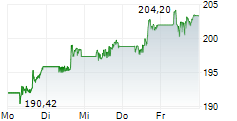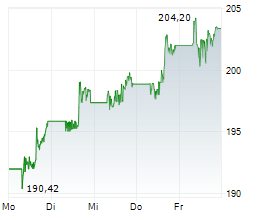
NEW BRUNSWICK (dpa-AFX) - Johnson & Johnson (JNJ) today announced that longer follow-up data from the landmark Phase 3 MARIPOSA study demonstrated that first-line treatment with RYBREVANT (amivantamab-vmjw) combined with LAZCLUZE (lazertinib) provided consistent benefits across long-term outcomes compared to osimertinib monotherapy in adult patients with advanced non-small cell lung cancer or NSCLC with epidermal growth factor receptor (EGFR) exon 19 deletions (ex19del) or L858R substitution mutations.
At three years (a median follow-up of 31.1 months), 61 percent of patients receiving RYBREVANT plus LACLUZE were alive compared to 53 percent of those treated with osimertinib based on an analysis performed at the request of a health authority, the company said.
The company stated that the overall survival will continue to be assessed with longer term follow-up as a key secondary endpoint. The primary efficacy outcome measure was progression-free survival (PFS) as assessed by blinded independent central review (BICR).
According to the company, the results also showed RYBREVANT plus LAZCLUZE demonstrated a trend toward improved central nervous system disease control compared to osimertinib at three years. At the three-year landmark, intracranial PFS was double for RYBREVANT plus LAZCLUZE versus osimertinib (38 percent vs 18 percent, respectively). More patients remained on treatment at three years with the RYBREVANT combination compared to osimertinib. Additionally, more patients receiving RYBREVANT and LAZCLUZET at the three-year follow-up had not started a subsequent therapy versus osimertinib. Progression-free survival after first subsequent therapy was 57 percent for the RYBREVANT combination compared to 49 percent for osimertinib.
For More Such Health News, visit rttnews.com.
Copyright(c) 2024 RTTNews.com. All Rights Reserved
Copyright RTT News/dpa-AFX
© 2024 AFX News





